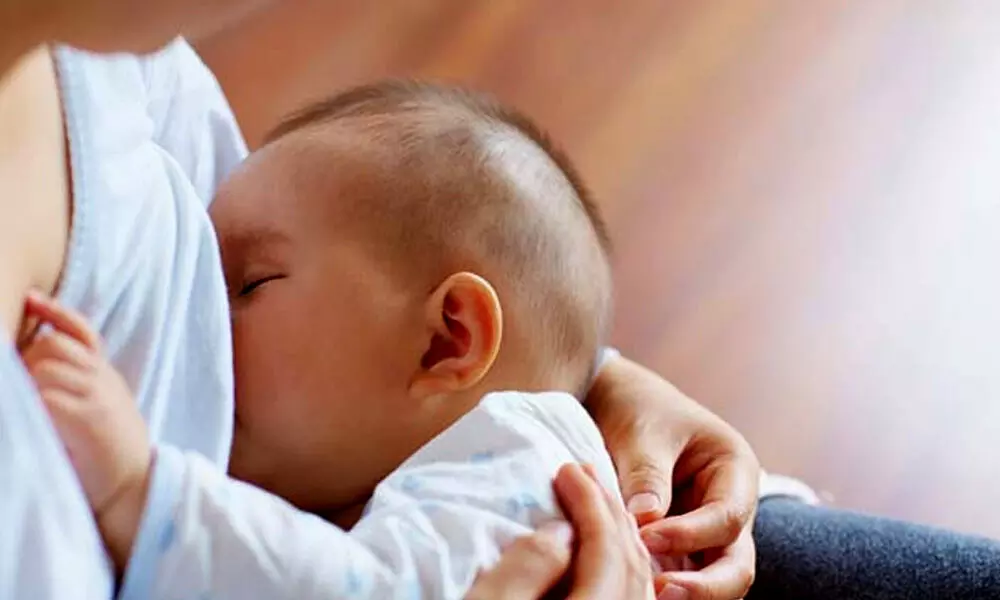Live
- Tumakuru implements emergency response system for women’s safety
- Sujeet Kumar elected to RS unopposed
- ACTO, two others held for Rs 4 cr fraud
- Adopt tech-based probe process: DGP Khurania
- Bhubaneswar: Four fraudsters held for operating fake gaming app
- Majhi asks new recruits to shun corruption
- Modi’s bold decision: Bommai hails PM
- Devotees experience normal rush at Tirumala amidst long queues
- Two BJP MLAs defy party decision to stage walk-out from Assembly
- Reality show contestant booked for misuse of explosives
Just In
Covid-specific antibodies remain in breast milk for 10 months post infection


For representational purpose (Photo/IANS)
Covid infection in breastfeeding women produces virus-neutralising antibodies that remain in their milk for up to 10 months, finds a new study.
New York: Covid infection in breastfeeding women produces virus-neutralising antibodies that remain in their milk for up to 10 months, finds a new study.
The study led by Icahn School of Medicine at Mount Sinai Hospital in New York showed that the antibodies in breast milk -- Secretory Immunoglobulin A -- are different to the Immunoglobulin G (IgG) antibodies that is found in human blood and are triggered by Covid vaccination, the Guardian reported.
The study was presented at the recent 15th Global Breastfeeding and Lactation Symposium.
"Approximately 10 per cent of infants will experience Covid-19 illness requiring advanced care. A potential mechanism to protect this population could be provided by passive immunity through the milk of a previously infected mother," said Dr Rebecca Powell from Icahn's Department of Medicine, Division of Infectious Diseases.
The Secretory Immunoglobulin A (IgA) sticks to the lining of babies' respiratory and intestinal tracts, and helps to block viruses and bacteria from entering their bodies.
Powell believes that these antibodies extracted from breast milk could also be beneficial to adults with severe Covid-19, the report said.
"It could be an incredible therapy, because Secretory IgA is meant to be in these mucosal areas, such as the lining of the respiratory tract, and it survives and functions very well there," Powell was quoted as saying.
For the study, the team took breast milk samples from 75 women who had recovered from Covid-19, and found that 88 per cent contained IgA antibodies. In most cases, these were capable of blocking infection.
They also found that women continued to secrete these antibodies for up to 10 months.
Moreover, Powell's team also investigated the link of Covid-specific antibodies in breast milk in 50 women after vaccination with either the Pfizer, Moderna, or Johnson & Johnson (J&J) jabs, the report said.
All women injected with the Moderna vaccine, and 87 per cent of those who received the Pfizer vaccine had coronavirus-specific IgG antibodies in their milk, while 71 per cent and 51 per cent, respectively, had virus-specific IgA antibodies. For the J&J vaccine, only 38 per cent of women had IgG antibodies and 23 per cent had IgA antibodies against coronavirus in their milk, it added.
"We know that the level of antibodies produced by RNA vaccines is extremely high compared to other vaccines. You don't necessarily need that much antibody to protect you from infection, but the milk effect really depends on there being a lot of antibody in your blood that's transferring into your milk. Because there's a lower level stimulated by the J&J vaccine (a viral vector vaccine), that's probably why there's very low levels in the milk,"Powell was quoted as saying.
The team is now investigating the antibody response in breast milk triggered by the AstraZeneca vaccine.

© 2024 Hyderabad Media House Limited/The Hans India. All rights reserved. Powered by hocalwire.com






